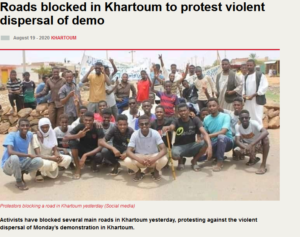Activists have blocked several main roads in Khartoum yesterday, protesting against the violent dispersal of Monday’s demonstration in Khartoum.
Blocking the roads is part of the escalation of protests announced by the Resistance Committees after Monday’s demonstration in front of the Council of Ministers offices was violently dispersed by the police.
The Resistance Committees in Sudan organised Marches of the Millions on Monday, calling on the transitional government to return to the principles of the Revolution.
The new civilian governor of Khartoum state, Ayman Khalid, and the Sudan Doctors Central Committee already condemned the violent dispersal of Monday’s demonstration.
Members of Resistance Committees in Burri in eastern Khartoum closed all the roads in the district yesterday. Barricades were also placed on roads in El Riyadh, El Deim, El Sahafa, and Jabra.
Activists in Arkoweet district in southern Khartoum announced a “revolutionary escalation schedule” for a week. Each day a road will be closed, to strengthen their demands for “peace, justice and correction of the course of the Revolution”.
The Democratic Lawyers Front declared its full support to the protests. The violence used against peaceful demonstrators “confirms the weakness of the authorities and their lack of resourcefulness to implement the goals of the revolution,” the Front said in a statement on Tuesday. “They do not believe in the slogans of the Revolution, the first of which is freedom of expression, now represented in protest marches in order to correct the course of that same Revolution.”
The Sudanese Lawyers Syndicate condemned the violation of freedom of expression by police forces as well. According to the lawyers, “the intimidation and arrest of demonstrators” is “a clear and blatant violation of the Constitutional Declaration” (signed by the then ruling Transitional Military Council and the then opposition Forces for Freedom and Change on August 17 last year).
“The security forces deviated from their functions and powers, stipulated in the Constitutional Declaration, and turned into a machine of repression that does not differ from the regime of Omar Al Bashir.”
The Syndicate referred to “the sacred right to peaceful expression and protest”, and said that “the legitimate demands of the revolutionaries are consistent with the contents of the Constitutional Declaration”.
It urged the Sovereign Council and the Council of Ministers to assume their responsibilities regarding “the unfortunate violence the demonstrators encountered on Monday afternoon”.
:::::
Protesters in Sudan have returned to the streets over the slow pace of change a year after a power-sharing agreement was signed between the country’s generals and a pro-democracy movement.
Draped in Sudanese flags and chanting slogans calling for more reforms, the demonstrators on Monday gathered outside the cabinet’s headquarters in the capital, Khartoum, to hand over a list of demands that include the election of a legislative body.
The Sudanese Professionals Association (SPA), an umbrella organisation of pro-democracy groups that spearheaded relentless protests that led to the overthrow of longtime President Omar al-Bashir last year, said on Twitter that security forces violently dispersed protesters after they demanded to meet Prime Minister Abdallah Hamdok and refused to negotiate with an envoy sent in his place.
Large amounts of tear gas were also fired at protesters.
:::::
Premierminister Abdallah Hamdok, der diese Übergangsregierung führt, nahm am Montagabend einen Brief der Demonstranten entgegen. Er betonte, seine Regierung habe durchaus Dinge erreicht, insbesondere bei den laufenden Gesprächen mit den diversen Rebellengruppen, die in Darfur und den Provinzen Blue Nile und Südkordofan aktiv bleiben. Am Dienstag unterzeichnete die Regierung mit Letzteren ein Teilabkommen.
Doch wie Hamdok am Montag eingestand: „Die Frage der Gerechtigkeit für die Opfer bleibt eine unserer wichtigsten Aufgaben.“ Allein das Niederschlagen der Proteste von 2019 forderte rund 250 Tote. In den Kriegen des Bashir-Regimes gegen das mittlerweile unabhängige Südsudan sowie gegen andere Aufständische starben mehrere Millionen Menschen.
1 Jahr nach der Revolution: Sudan

